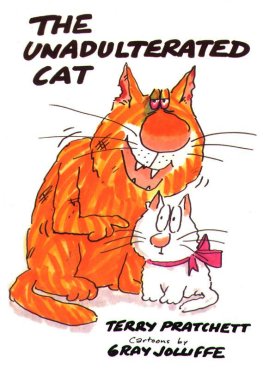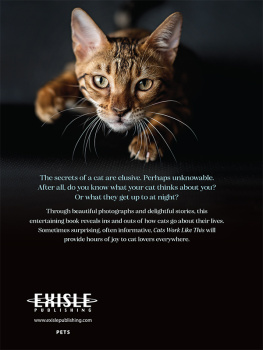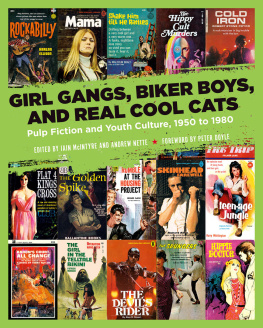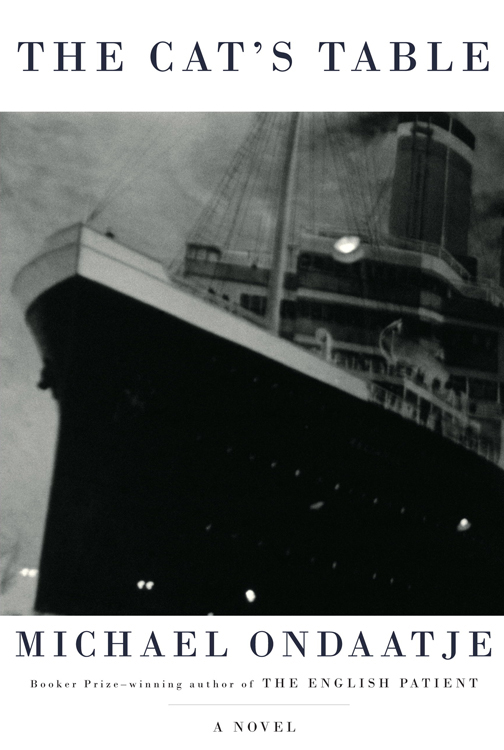A NOTE ABOUT THE AUTHOR
Michael Ondaatje is the author of five previous novels, a memoir, a nonfiction book on film, and several books of poetry. The English Patient won the Booker Prize; Anils Ghost won the Irish Times International Fiction Prize, the Giller Prize, and the Prix Mdicis. Born in Sri Lanka, he now lives in Toronto.
AUTHORS NOTE
Although the novel sometimes uses the colouring and locations of memoir and autobiography, The Cats Table is fictionalfrom the captain and crew and all its passengers on the boat down to the narrator. And while there was a ship named the Oronsay (there were in fact several Oronsays), the ship in the novel is an imagined rendering.
ACKNOWLEDGEMENTS AND CREDITS
Robert Creeley for a stanza from his poem Echo (); a line by Kipling from The Sea and the Hills; a verse by A. P. Herbert. A paragraph from Joseph Conrads Youth, a passage by R. K. Narayan, and a line by Beckett about despair. The remark by Proust appears in a letter to Ren Blum, 1913. The lines from Jelly Roll Mortons Winin Boy Blues appear in Alan Lomaxs Mister Jelly Roll (1950). Other songs quoted, or referred to, are by Johnny Mercer, Hoagy Carmichael, Sidney Bechet, and Jimmie Noone. Some information on Sidney Bechet is drawn from Whitney Ballietts wondrous American Musicians II (included is a quote by Richard Hadlock that appeared in the San Francisco Examiner). Thanks to the Daily News, Sri Lanka, for the germ of the Sir Hector story that had its basis in a long-ago incident. The characters, names, and dialogue in this novel however are pure invention, as is placing Sir Hector on a sea voyage. Material on triremes is drawn from The Lords of the Sea by John R. Hale. Eudora Welty wrote the two lines (quoted below) on embarcation in The Optimists Daughter. Mr Mazappas good book is The Maltese Falcon by Dashiell Hammett. The scrawled lines in the visitors book at Cassiuss art show were written by his friend, Warren Zevon, who was visiting from New Jersey.
THANKS
To Larry Schokman, Susie Schlesinger, Ellyn Toscano, Bob Racie, Laura Ferri, Simon Beaufoy, Anna Leube, Duncan Kenworthy, Beatrice Monti, Rick Simon, Coach House Press, Jet Fuel in Toronto, the Bancroft Library in Berkeley, California. Also John Berger, Linda Spalding, Esta Spalding, Griffin Ondaatje, David Young, Gillian and Alwin Ratnayake, Ernest Macintyrefor the loan of a character, Anjalendran, Aparna Halp, and Sanjaya Wijayakoon. To Stewart Blackler and Jeremy Bottle, as well as David Thomson some years later. And Joyce Marshall, who once smoked a cane chair.
*
Thank you to Ellen Levine, Steven Barclay, Tulin Valeri, Anna Jardine, Meagan Strimus, Jacqueline Reid, and Kelly Hill. Thanks to all at Knopf, USAKatherine Hourigan, Diana Coglianese, Lydia Buechler, Carol Carson, and Pei Loi Koay. Many thanks to Louise Dennys and Sonny Mehta and Robin Robertson. A very special thank-you to my Canadian editor and publisher Ellen Seligman.
*
For Stella, the sweet hunterno more thunderstorms.
For Dennis Fonseka, in memorium.
The boat came breasting out of the mist and in they stepped.
All new things in life were meant to come like that

HE WASNT TALKING. He was looking from the window of the car all the way. Two adults in the front seat spoke quietly under their breath. He could have listened if he wanted to, but he didnt. For a while, at the section of the road where the river sometimes flooded, he could hear the spray of water at the wheels. They entered the Fort and the car slipped silently past the post office building and the clock tower. At this hour of the night there was barely any traffic in Colombo. They drove out along Reclamation Road, passed St. Anthonys Church, and after that he saw the last of the food stalls, each lit with a single bulb. Then they entered a vast open space that was the harbour, with only a string of lights in the distance along the pier. He got out and stood by the warmth of the car.
He could hear the stray dogs that lived on the quays barking out of the darkness. Nearly everything around him was invisible, save for what could be seen under the spray of a few sulphur lanternswatersiders pulling a procession of baggage wagons, some families huddled together. They were all beginning to walk towards the ship.
He was eleven years old that night when, green as he could be about the world, he climbed aboard the first and only ship of his life. It felt as if a city had been added to the coast, better lit than any town or village. He went up the gangplank, watching only the path of his feetnothing ahead of him existedand continued till he faced the dark harbour and sea. There were outlines of other ships farther out, beginning to turn on lights. He stood alone, smelling everything, then came back through the noise and the crowd to the side that faced land. A yellow glow over the city. Already it felt there was a wall between him and what took place there. Stewards began handing out food and cordials. He ate several sandwiches, and after that he made his way down to his cabin, undressed, and slipped into the narrow bunk. Hed never slept under a blanket before, save once in Nuwara Eliya. He was wide awake. The cabin was below the level of the waves, so there was no porthole. He found a switch beside the bed and when he pressed it his head and pillow were suddenly lit by a cone of light.
He did not go back up on deck for a last look, or to wave at his relatives who had brought him to the harbour. He could hear singing and imagined the slow and then eager parting of families taking place in the thrilling night air. I do not know, even now, why he chose this solitude. Had whoever brought him onto the Oronsay already left? In films people tear themselves away from one another weeping, and the ship separates from land while the departed hold on to those disappearing faces until all distinction is lost.
I try to imagine who the boy on the ship was. Perhaps a sense of self is not even there in his nervous stillness in the narrow bunk, in this green grasshopper or little cricket, as if he has been smuggled away accidentally, with no knowledge of the act, into the future.
He woke up, hearing passengers running along the corridor. So he got back into his clothes and left the cabin. Something was happening. Drunken yells filled the night, shouted down by officials. In the middle of B Deck, sailors were attempting to grab hold of the harbour pilot. Having guided the ship meticulously out of the harbour (there were many routes to be avoided because of submerged wrecks and an earlier breakwater), he had gone on to have too many drinks to celebrate his achievement. Now, apparently, he simply did not wish to leave. Not just yet. Perhaps another hour or two with the ship. But the Oronsay was eager to depart on the stroke of midnight and the pilots tug waited at the waterline. The crew had been struggling to force him down the rope ladder, however as there was a danger of his falling to his death, they were now capturing him fishlike in a net, and in this way they lowered him down safely. It seemed to be in no way an embarrassment to the man, but the episode clearly was to the officials of the Orient Line who were on the bridge, furious in their white uniforms. The passengers cheered as the tug broke away. Then there was the sound of the two-stroke and the pilots weary singing as the tug disappeared into the night.














